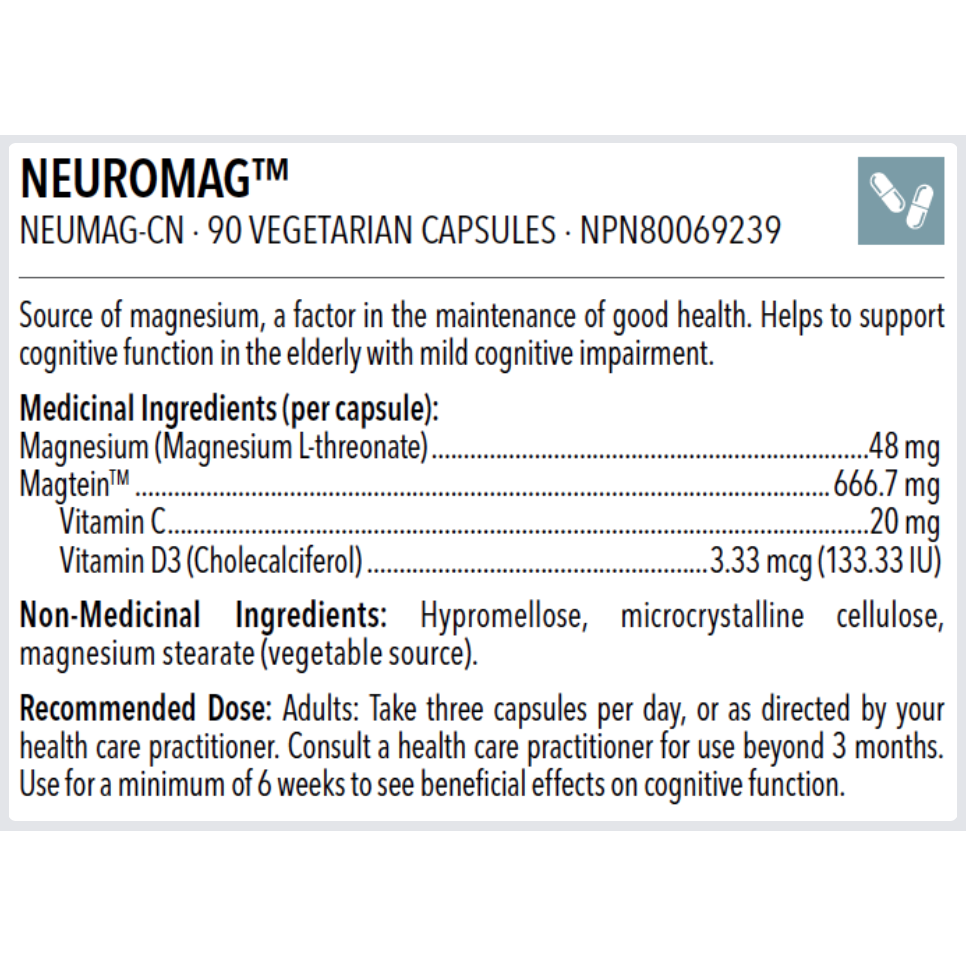

NeuroMag™
Several studies indicate that synaptic connections in the brain hippocampus, a critical brain region for learning and memory, decline during the normal process of aging. NeuroMag™, which uses the unique, patented, chelated mineral Magtein™, contains magnesium which is chelated to threonic acid (magnesium L-threonate). It is superior to other forms of magnesium at getting through the blood brain barrier because it is able to transport magnesium ions across lipid membranes, including those of brain cells.
NeuroMagTM features the unique, patented, chelated mineral Magtein®, which is magnesium chelated to threonic acid (magnesium L-threonate). This ionophore has been found to be superior to other forms of magnesium at getting through the blood brain barrier as it is able to transport ions (in this case magnesium ions) across lipid membranes, including brain cells.
Why magnesium for the brain?
Magnesium deficiency is well known to produce neuropathologies. Only 16% of the magnesium found in whole wheat remains in refined flour, and magnesium has been removed from most drinking water supplies, setting a stage for magnesium deficiency. This is aggravated by the fact that magnesium is depleted by stress, sweating, alcohol consumption and many medications. Magnesium ions regulate calcium ion flow in neuronal calcium channels, helping to regulate neuronal nitric oxide production. In magnesium deficiency,
neuronal requirements for magnesium may not be met, causing neuronal damage, which could manifest as memory loss, depression and more.
Stress exposure, depending on its intensity and duration, affects cognition and learning. Follows is a direct quote from a study published in the Journal of Neurosciences: “Studies suggest that enhancement of plasticity in certain brain regions such as the prefrontal cortex (PFC) and/or hippocampus might enhance the efficacy of cognitive therapy. We found that elevation of brain magnesium, by a novel magnesium compound [magnesium-l-threonate (MgT)], enhances synaptic plasticity in the hippocampus and learning and memory in rats. Here, we show that MgT treatment enhances retention of the extinction of fear memory, without enhancing, impairing, or erasing the original fear memory.”
Several studies indicate that these same synaptic connections in the brain hippocampus, a critical brain region for learning and memory, decline during aging. Studies have also found low levels of magnesium in the brains of patients suffering from Alzheimer’s disease. Researchers at MIT conclude that elevating brain magnesium levels with Magtein® may be beneficial in enhancing cognitive abilities and preventing age-related memory decline. Increasing plasticity in the prefrontal cortex and amygdala of the brain improves memory because these brain areas are also deeply involved in mediating the effects of exposure to stress on memory.
Medicinal Ingredients (per capsule):
Magnesium
(Magnesium L-threonate)...................................................................................48 mg MagteinTM...................................................................................................... 666.7 mg
Vitamin C........................................................................................................................20 mg
Vitamin D3 (Cholecalciferol)......................................................... 3.33 mcg (133.33 IU) Non-Medicinal Ingredients: Hypromellose, microcrystalline cellulose, magnesium stearate (vegetable source). Recommended Dose: Adults: Take three capsules per day, or as directed by your health care practitioner. Consult a health care practitioner for use beyond 3 months. Use for a minimum of 6 weeks to see beneficial effects on cognitive function. Dosing recommendations are given for typical use based on an average 150 pound healthy adult. Healthcare practitioners are encouraged to use clinical judgement with case-specific dosing based on intended goals, subject body weight, medical history, and concomitant medication and supplement usage.
Choose options


